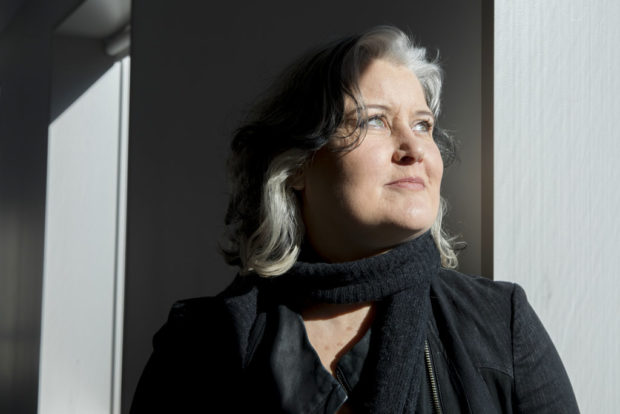
In this Jan. 3, 2018 photo, Paula Cole poses for a portrait in New York to promote her album “Ballads,” a collection of 20 jazz covers. (Photo by Amy Sussman/Invision/AP, File)
NEW YORK (AP) — Twenty years ago, Paula Cole heard her name called, went up to the stage and took home the Grammy Award for best new artist. It was an amazing achievement on a night that turned out to be quite complicated.
The then-30-year-old met her idol, Aretha Franklin, and sang her hit “Where Have All the Cowboys Gone?” in front of millions. But she also felt misunderstood and uncomfortable in the spotlight. Cole shocked some people by raising her middle finger and beatboxing during her performance, and triggered jokes for daring to bare armpit hair.
All these years later, that Grammy isn’t her favorite accomplishment. That would be her daughter, Sky, now 16. And her fans, who have stayed loyal, funding her last two albums via Kickstarter. Her story is a cautionary one for anyone thinking that winning one of music’s most coveted awards solves everything.
“That night was laden and confused and amazing,” says Cole, who turns 50 in April. “My career on the other side of that has been definitely different — smaller, humbler, a more authentic career. A more authentic second adulthood, if you will.”
The Berklee College of Music-trained Cole is now touring to promote her album “Ballads,” a collection of 20 jazz covers primarily from the 1930s-1960s. It honors her dad, a bass player in a polka band, and it also allowed her to go back to her roots.
“I intended to be a jazz singer. That’s where I started and my first gigs were in jazz clubs,” she says. “I got rerouted because I wanted to write my own songs with my own truths.”
Cole went into the Grammy Awards in New York in 1998 as a Lilith Fair veteran with seven nominations from her second album, “This Fire,” which contained the hit “I Don’t Want to Wait,” which became the theme song for “Dawson’s Creek.”
In this Jan. 3, 2018 photo, Paula Cole poses for a portrait in New York to promote her album “Ballads,” a collection of 20 jazz covers. (Photo by Amy Sussman/Invision/AP, File)
Her “Where Have All the Cowboys Gone?” — a wry, ironic study of gender stereotypes — had been incorrectly seen by some as nostalgic and anti-feminist. Her flipping the bird onstage was a sign that she was firmly in satire mode but it also underlined her discomfort that night.
“I was a very dark horse — self-produced, definitely very progressive and left,” says Cole, who took home best new artist honors, beating boy band Hanson, singers Fiona Apple and Erykah Badu, and rapper Diddy.
In the aftermath, Cole faced a backlash and her manager complained that sales of her music plummeted. Jay Leno made a Paula Cole doll with rotating armpits to shine his shoes with.
“There was a lot of hate coming down on me after,” she says. “All of that attention was ill-fitting for this introvert. And I ebbed away after the Grammys.”
Cole took eight years off to raise her daughter, who was born with severe asthma. Cole re-emerged to a changed musical landscape, but with her determination to remain independent intact. She looks back and realizes she probably never really belonged on the Top 40 charts.
“That trajectory that I was on needed to be stopped. This is who I’m meant to be now. I needed to stop and I needed a reset,” she says. “I needed to take a hiatus — kind of shed that ill-fitting skin that somehow was created for me.”
Cole has returned to the Berklee College of Music in Boston as a voice teacher, offering classes that quickly oversubscribe.
Anne Peckham, who chairs the voice department, calls Cole a beloved teacher who is known for her generosity. Cole even offers her most talented students the chance to open for her when she performs.
“She has a quality about her that really draws people close to her and helps students learn more about themselves,” Peckham says. “Can you imagine as a student having a Grammy winner offer to help you in your career by opening up for them?”
Cole says she learns from her students as much as they learn from her. She feels a responsibility to expose them to the pioneers.
“Nourish yourself,” she says. “Go back and listen to the masters and honor the masters and be part of the legacy.”
One of those masters is Bobbie Gentry, one of the first female country artists to compose and produce her own material. She covers Gentry’s “Ode to Billie Joe” on her new album.
Cole remembers hearing Gentry when she played her parents’ albums as a kid, and the more that the adult Cole dug into Gentry’s past, the more she found parallels.
Like Cole, Gentry also won the best new artist Grammy and self-produced. Like Cole, Gentry wasn’t a fan of the spotlight. “I found out she won best new artist and that she also did not like the attention and found herself in the patriarchal playing fields and withdrew as an introvert. And I relate to all of that.”
She hopes to meet Gentry one day. “I’d love to just give her a big hug,” Cole says, “and say, ‘Thank you. Thank you for being a mentor to me and to so many.'” MKH
RELATED STORIES:
Michael Jackson’s impact on art revealed in new show
U2 returns to new relevance with sloganeering rock